Coronavirus: Indonesia grapples with fear of a hidden virus surge
- Published
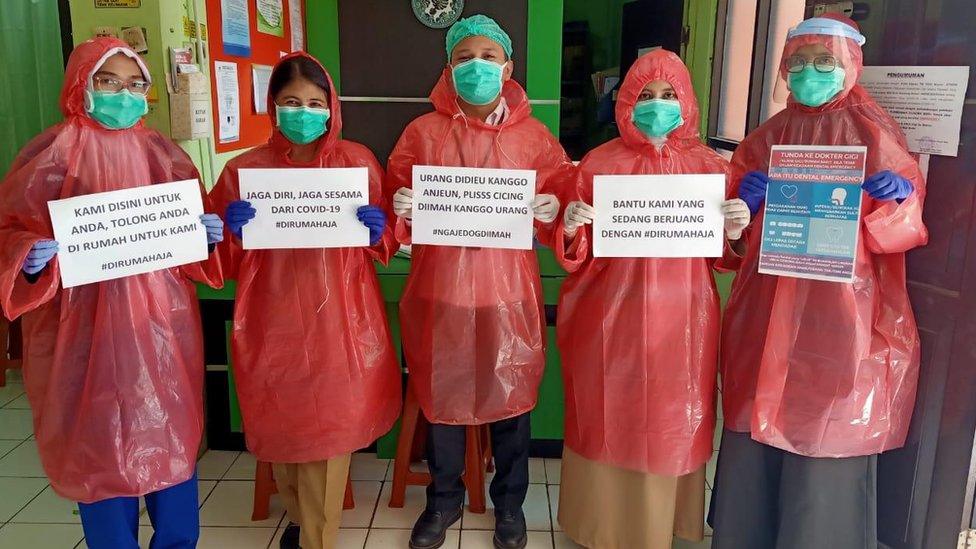
Novita, and her fellow nurses, wear raincoats to protect themselves
Indonesia - one of the worlds most populous and far-flung nations - only just closed its borders, but experts fear this came too late. As the BBC's Resty Woro Yuniar and Aghnia Adzkia report, its healthcare system will not be able to cope amid warnings that official figures mask the true scale of virus cases.
It may have only registered its first coronavirus case in March but now Indonesia is second only to China for coronavirus deaths in Asia. Among the dead are at least 12 health workers, including two doctors in their 30s.
Novita Purwanti and her fellow nurses, at a public health centre in Bandung, West Java, are all too aware of this. They pooled funds to buy raincoats and two medical goggles to share.
"We disinfected the raincoats so that we can use them again, while we're waiting for the protective kits from the health agency to arrive," she explains.
"I can't buy a N95 mask, it's too expensive and they are hard to find."
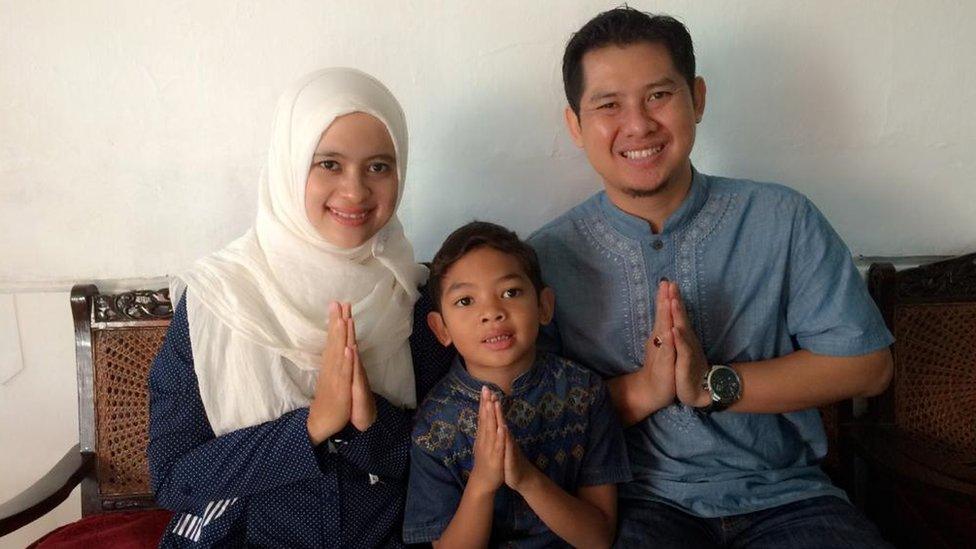
Novita says she is stressed and can't sleep with worry.
She is on the frontline in the fight against coronavirus that is feared to be widespread and under the radar in the world's largest archipelago.
"I'm stressed. I can't sleep. I always touch patients, despite not knowing for sure whether they're carriers or not," nurse Novita, a mother of two young children, says.
A study by the London-based Centre for Mathematical Modelling of Infectious Diseases released last week estimates that as few as 2% of Indonesia's coronavirus infections have been reported. That would bring the true number to more than 89,000 but a serious lack of testing, as with many other nations, means we will never be sure.

Jakarta Governor Anies Baswedan has said people should be buried with their bodies wrapped in plastic, even if they haven't tested positive.
"Maybe some of them have not been tested. Or maybe some had been tested but the results have not come back," he said.
Children are also among the growing death toll in Indonesia, according to the Paediatric Society. "We are having to try and keep track ourselves," says Dr Aman Pulungan the group's president.
"We know of at least four child deaths. The youngest was 3 years old."
Archipelago woes
Indonesia's size and remoteness, puts it in a position that very few other nations face. It is made up of some 17,000 islands and islets and even in good times its healthcare system is poor, particularly in remote areas.
On average there is just one hospital bed per 1,000 people in Indonesia according to the World Health Organisation (WHO). China has four times as many, while South Korea has 11 times more hospital beds.
In 2017, the WHO found Indonesia had four doctors per 10,000 people. Italy had 10 times more, on a per capita basis. South Korea has six times more doctors.


Indonesia's decentralised system of government and messy bureaucracy also means rolling out one healthcare message or policy is challenging.
It also has one of the lowest health expenditures in the region.

It was just five weeks ago that Indonesia's officials were fiercely rejecting suggestions that infections were spreading undetected. They were slow to even stop direct flights from Wuhan, China to the holiday island of Bali.
The country's Health Minister, Terawan Agus Putranto, said it was "insulting" to suggest cases were not being detected and argued that Indonesia had not yet recorded a single case "all because of prayers". Other officials suggested it was because of the country's subtropical climate.
Weeks later, the picture is very different.
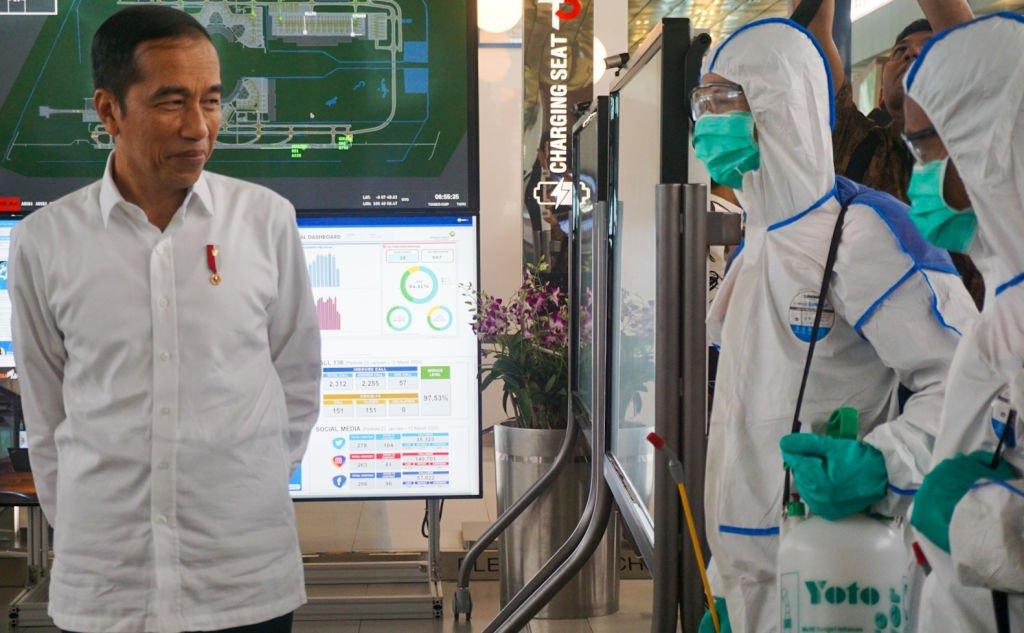
President Joko Widodo said he didn't want to cause 'unrest' in society.
Last month, President Joko Widodo admitted the government had filtered information about the spread of the virus saying "we don't want to make the public panic, we don't want to cause unrest in the society".
Now that they have closed borders, they are also proposing to allow regional governments to impose lockdowns, something many have been demanding.
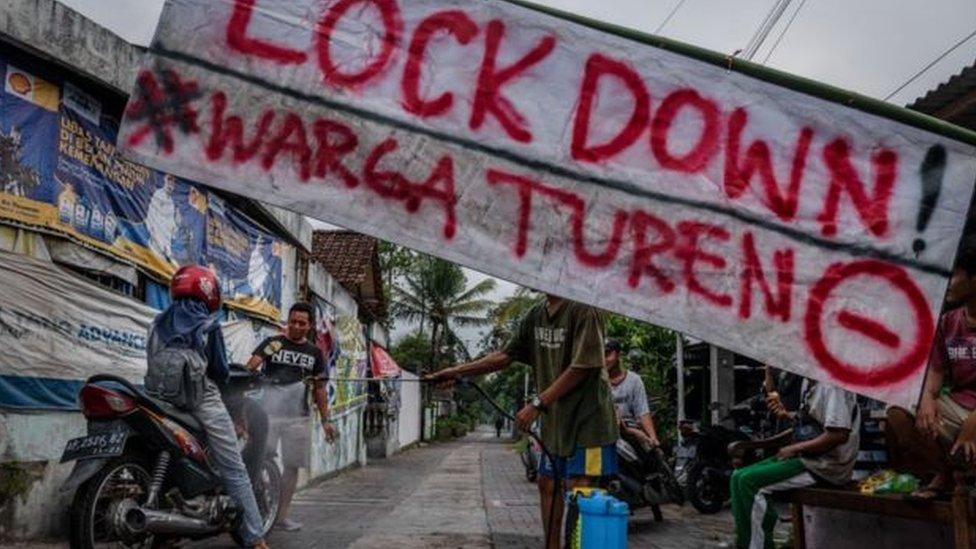
Some communities have enforced their own lockdowns.
Jakarta's threat
In particular there are growing calls for a lockdown in Jakarta to try and prevent a further exodus of people as jobs are lost, when the Muslim-majority nation celebrates the end of the fasting month in May.
For now, Jakarta is the epicentre of the pandemic in Indonesia, but in recent weeks thousands of people have travelled from the capital to their homes in other parts of the country, raising the threat of infections multiplying all over the nation.
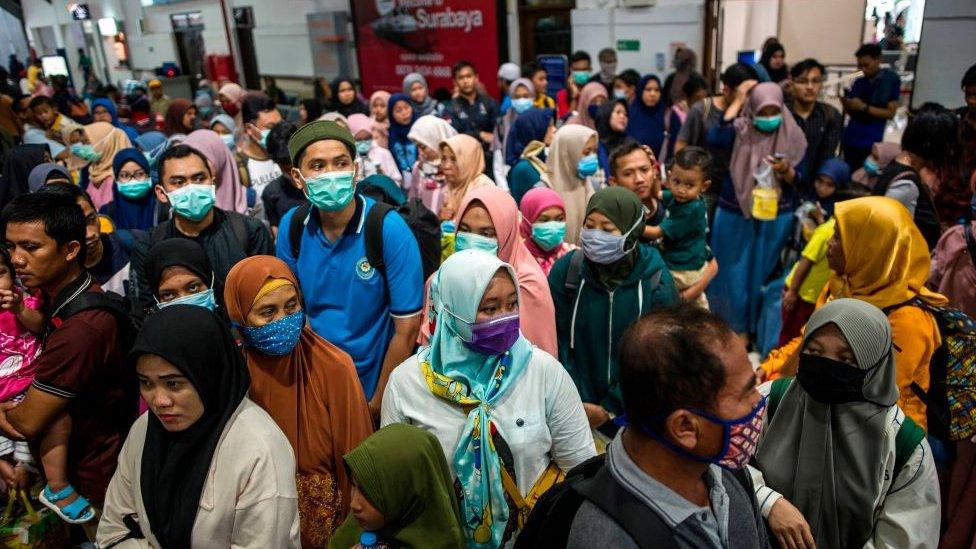
But President Joko Widodo stopped short of doing that this week, saying instead, in a televised address, that social distancing rules would be implemented more firmly.
"We still want to keep economic activity alive, but everyone has to practice social distancing, physical distancing that's the most important thing," he said.
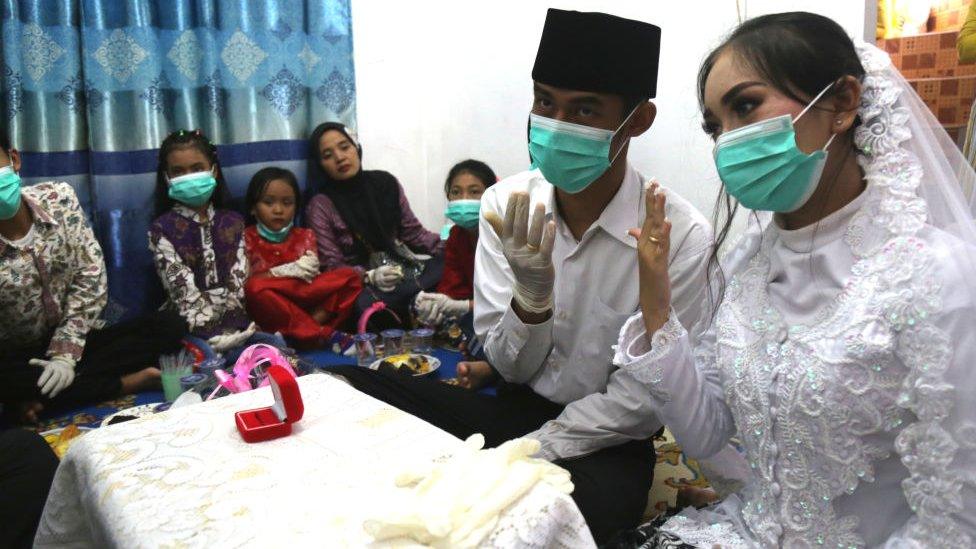
Some couples have gone ahead with wedding plans.
But the reality is that being able to social distance is a luxury, with many people living in densely-populated neighbourhoods, or kampungs, where extended families live closely together.
Schools and entertainment spots have been closed in the Indonesian capital for about two weeks, normally bustling malls are deserted and the roads quieter than usual.
But public transport is still busy as the vast majority of people can't work from home.
Remote healthcare system can't cope
The remotest region of Papua, where the healthcare system is the weakest, has already closed its borders to non-residents.
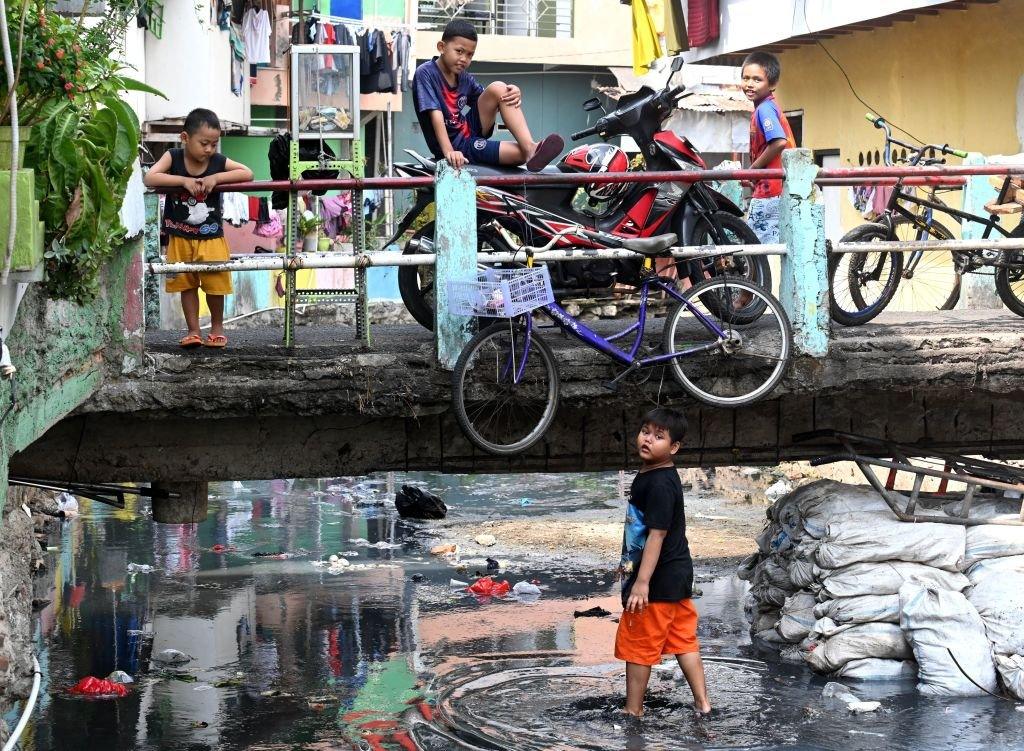
Many people live close together, making social distancing difficult.

"Our data is clear, we are not ready to face this pandemic," Silwanus Sumule, head of the Covid-19 task force in Papua, said.
He says 70 percent of hospital beds in Papua are already occupied.
"What can we do if people develop symptoms here? It is already difficult treating our own residents."
Of the 202 isolation rooms available in Papua, only two meet the WHO standard.
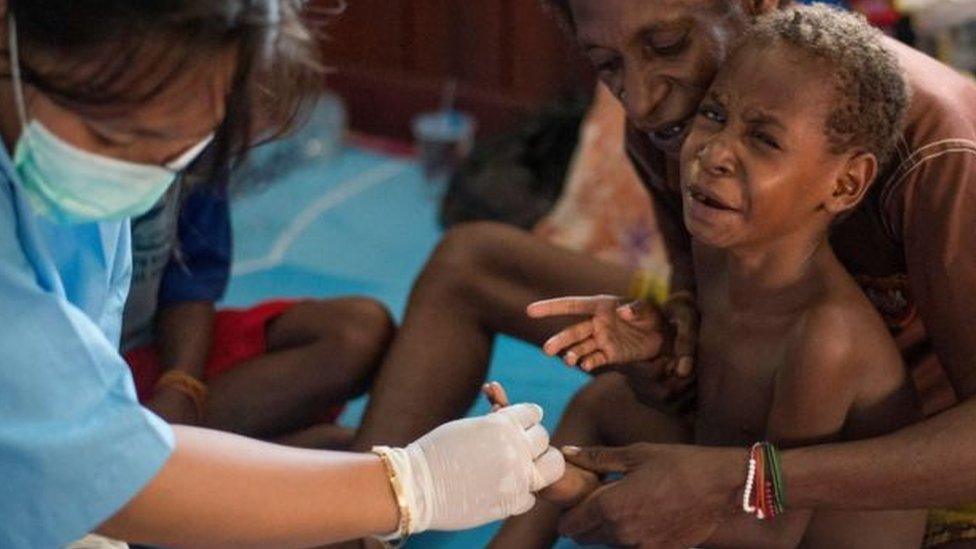
Health workers say they desperately lack resources.
Health experts say greater protection to those on the frontline is a critical need right now.
"If we don't protect them, doctors and nurses will die, many of them will drop dead," warns Zubairi Djoerban, the head of the Covid-19 task force at Indonesian Doctors' Association.
In state and private hospitals in the capital Jakarta, there are similar stories of severe shortages of protective gear leaving doctors to buy their own or improvise with raincoats.
"It's very likely that we will experience what has happened in Italy where 9.5 percent of infected Covid-19 patients are healthcare staff. But, if our preparation is worse than Italy, the number could be higher."
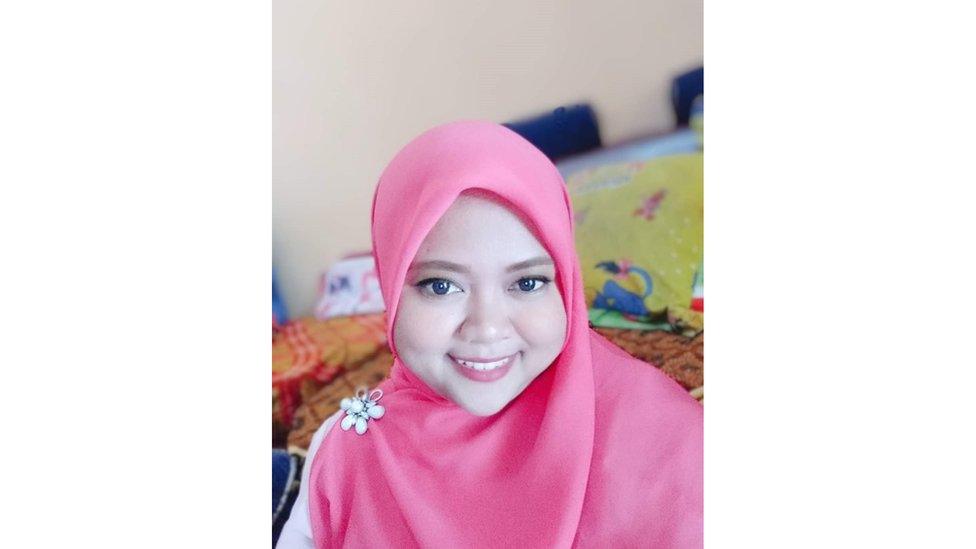
Ninuk is one twelve health workers who have died from the virus.
Ninuk, a 37-year-old nurse, told her husband that she believed she had caught the coronavirus, shortly before Indonesia officially announced its first case.
"I got the virus. Do you think I can still survive?" she asked her husband, Arul.
"I told her to calm down. I said it was in the hands of Allah. I could only lift up her spirits," he says.
She died on 12 March, alone in a hospital bed.
Arul said his wife didn't wear protective equipment for Covid-19 at the government-run hospital in central Jakarta where she had worked for the last 12 years.
He says his late wife told him "I lived to care for those I loved and died doing that."
Additional reporting by Callistasia Wijaya, Yuli Saputra and Rebecca Henschke.